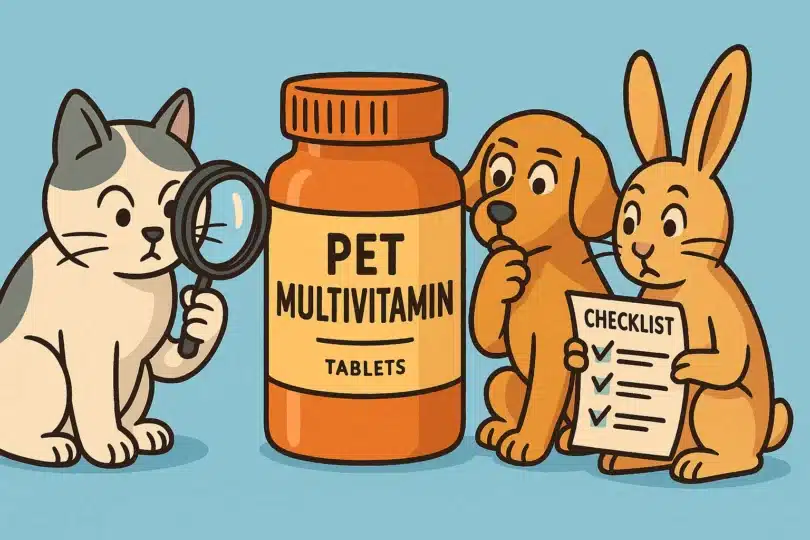Walk through any pet store aisle in 2025, and you’ll see dozens of brightly colored bottles and chews promising to be the “complete multivitamin” for dogs and cats. With so many choices, pet owners often feel overwhelmed. Do pet multivitamins really work? And if so, how do you pick the right one? This article explains what multivitamins can (and can’t) do for pets, the key ingredients to look for, and how to make an informed choice without falling for marketing hype.
Do Pets Really Need Multivitamins?
Commercial pet foods are typically fortified with vitamins and minerals, meaning healthy young pets may not need additional supplementation. However, there are situations where a multivitamin can help:
- Aging pets with higher nutrient demands
- Picky eaters or pets on homemade/raw diets
- Pets recovering from illness or stress
- Animals with digestive issues that affect absorption
In these cases, multivitamins can provide a nutritional safety net, supporting immunity, energy, and overall vitality.
Key Ingredients to Look For
- Vitamin A: Supports vision, skin, and immune function.
- B vitamins: Vital for energy metabolism and nerve health.
- Vitamin D: Essential for bone health, but dosing must be carefully controlled.
- Vitamin E: A powerful antioxidant that protects cells from damage.
- Vitamin K: Important for blood clotting and bone strength.
- Minerals: Zinc, selenium, calcium, and magnesium for balanced wellness.
High-quality products list exact dosages, use pet-safe forms, and avoid fillers or artificial colors.
Types of Pet Multivitamins
- Chews: Soft and flavored, these are the easiest to give and often include added ingredients like probiotics.
- Powders: Easy to mix into food, with flexible dosing for multiple pets.
- Tablets: Less palatable but often more concentrated.
- Liquids: Convenient for small pets or cats who resist pills.
How to Choose the Best Pet Multivitamins
- Vet approval: Look for products formulated with veterinary input.
- Transparency: Avoid vague labels like “proprietary blend.” Exact dosages matter.
- Third-party testing: Independent verification ensures purity and potency.
- Species-specific formulas: Dogs and cats require different nutrient ratios—never share human vitamins with pets.
Pet Multivitamins – Market Trends in 2025
The pet multivitamins market is shifting toward all-in-one chews that combine vitamins with functional ingredients like omega-3s, probiotics, or joint support. Subscription delivery models are popular, keeping owners consistent with daily dosing. Affiliates benefit from high repeat purchase rates and brand loyalty in this category.
Risks and Considerations
While deficiencies can harm pets, so can overdoses. Too much vitamin D can damage kidneys, while excessive calcium may cause skeletal problems in growing dogs. Pet owners should avoid cheap, unregulated supplements and stick with established, vet-approved brands. When in doubt, consulting a veterinarian is always best.
Closing
A well-chosen multivitamin can be a valuable addition to a pet’s diet, especially for seniors, picky eaters, or those with special needs. By focusing on high-quality, transparent, and species-specific products, pet owners can provide real benefits without unnecessary risks. In 2025, pet multivitamins remain one of the simplest ways to support long-term health and vitality—if chosen wisely.

